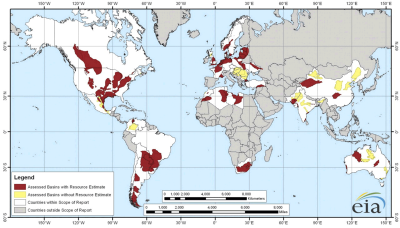These days a piece of good news is like saffron. The world today is clearly dominated by the negative ones: the financial crisis, debt crisis, Euro crisis, the economic problems of Iceland, Ireland, Greece, Spain and recently Cyprus. Therefore, it is obvious that when the good news appears, from time to time, it begins to fade away in a flood of negative ones.
The recent good news came from the United States thanks to advances in technology and new methods of production in recent years. Shale gas, which is a natural gas extracted from shale formations, has become the primary source of energy, which for decades has been one of the sources from which the world could gain a significant share of energy. The US has ambition that by 2020 half of its consumption of natural gas be acquired by shale gas extraction.
The success of shale gas in the U.S. has produced a wave of enthusiasm and criticism, too. The enthusiasts are especially the countries looking for the best ways to meet the energy crisis needs of their economies, as well as those which, according to explorations, have large reserves of shale gas. These countries are in almost all parts of the world. On the other hand, various environmental organizations criticize utilization of such energy due to the fact that extraction of shale gas poses a threat to living environment. Besides, shale gas is a suspicious solution to the energy crisis.
But the fact is that “the shale revolution” significantly undermines the stereotype that humanity is moving toward a deadlock with exhausted energy resources. According to a publication of the International Energy Agency, thanks to the discovery of shale gas reserves, the total amount of natural gas has been doubled from 125 to 250 years. Therefore, it is obvious that some European countries, most importantly Poland, have already built up high expectations.
If they manage to successfully answer all questions relating to the environment, increase the extraction of shale gas in the world and increase the offered production on European energy market, they would be able to exert pressure on existing gas suppliers, which in the case of Europe would result in lower prices of natural gas imported from third countries, in particular from Russia. And this is definitely good news for Slovakia.
[Firstly published in Economic Daily (Hospodarske Noviny)]



















No comments
Be the first one to leave a comment.